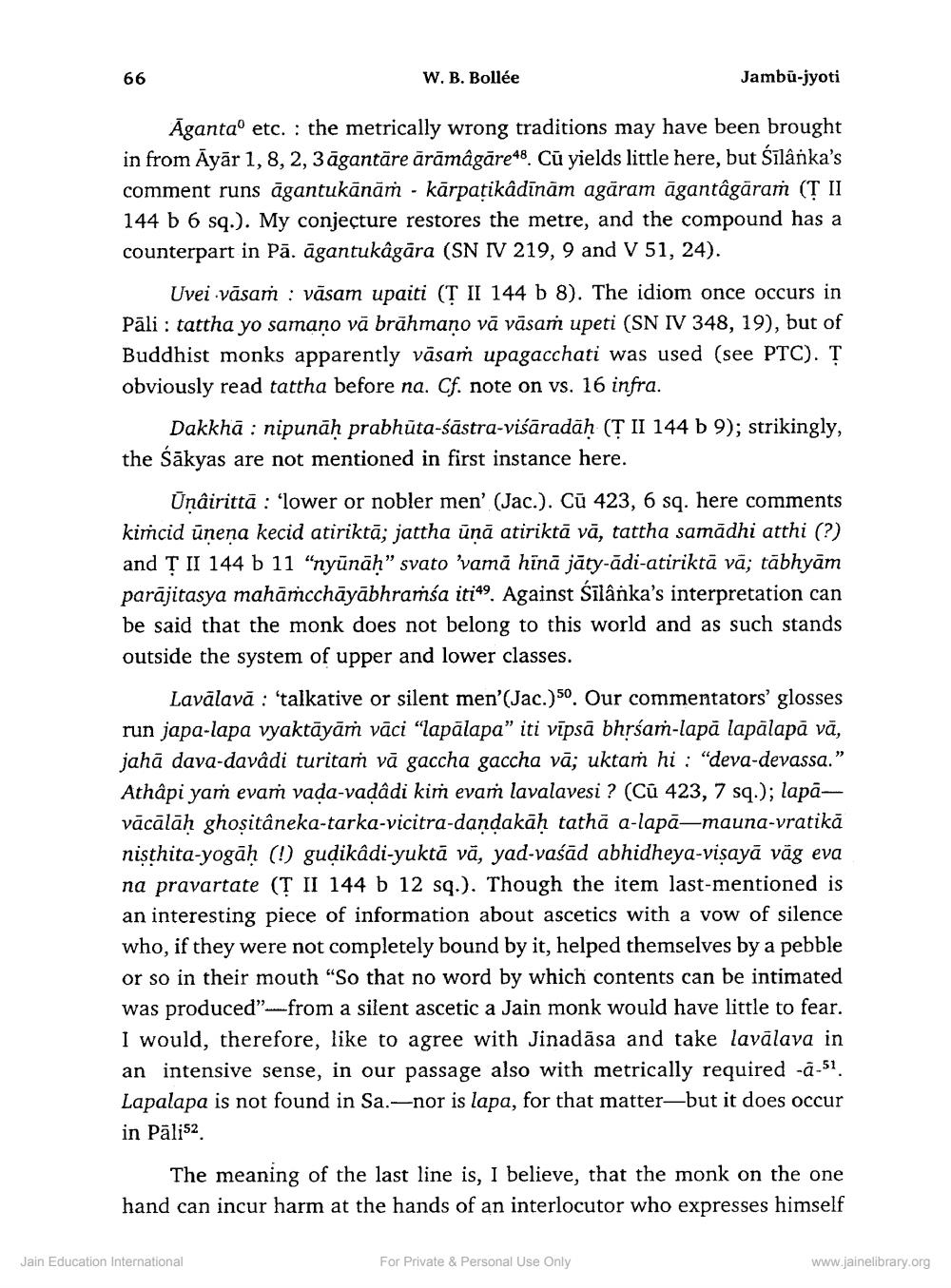________________
66
W. B. Bollée
Jambū-jyoti
Āgantao etc. : the metrically wrong traditions may have been brought in from Āyār 1, 8, 2, 3 āgantāre ārāmâgāre48. Cū yields little here, but Śīlanka's comment runs āgantukānāṁ - kārpaţikâdīnām agāram āgantâgāram (? II 144 b 6 sq.). My conjecture restores the metre, and the compound has a counterpart in Pā. ägantukâgāra (SN IV 219, 9 and V 51, 24).
Uvei vasaṁ : vāsam upaiti (T II 144 b 8). The idiom once occurs in Pāli : tattha yo samano vā brāhmano vā väsar upeti (SN IV 348, 19), but of Buddhist monks apparently vāsaṁ upagacchati was used (see PTC). T obviously read tattha before na. Cf. note on vs. 16 infra.
Dakkhā : nipunāh prabhūta-śāstra-viśāradāh (Ţ II 144 b 9); strikingly, the sākyas are not mentioned in first instance here.
Ünâirittā : 'lower or nobler men' (Jac.). Cū 423, 6 sq. here comments kimcid unena kecid atiriktā; jattha ünā atiriktā vā, tattha samadhi atthi (?) and T II 144 b 11 "nyūnāh” svato 'vamā hīnā jāty-ādi-atiriktā vā; tābhyām parajitasya mahāṁcchāyābhraṁsa iti49. Against Silânka's interpretation can be said that the monk does not belong to this world and as such stands outside the system of upper and lower classes.
Lavālavā : 'talkative or silent men'(Jac.)50. Our commentators' glosses run japa-lapa vyaktāyām vāci “lapālapa” iti vīpsā bhṛśaṁ-lapā lapālapā vā, jahā dava-davâdi turitam vā gaccha gaccha vā; uktam hi : "deva-devassa.” Athâpi yaṁ evaṁ vada-vadâdi kim evam lavalavesi ? (Cu 423, 7 sq.); lapā
īcālāh ghositâneka-tarka-vicitra-dandakāh tathā a-lapā-mauna-vratikā nisthita-yogāh (!) gudikâdi-yuktā vă, yad-vaśād abhidheya-visayā vāg eva na pravartate (T II 144 b 12 sq.). Though the item last-mentioned is an interesting piece of information about ascetics with a vow of silence who, if they were not completely bound by it, helped themselves by a pebble or so in their mouth “So that no word by which contents can be intimated was produced"...from a silent ascetic a Jain monk would have little to fear. I would, therefore, like to agree with Jinadāsa and take lavālava in an intensive sense, in our passage also with metrically required --51. Lapalapa is not found in Sa.-nor is lapa, for that matter—but it does occur in Pālis2
The meaning of the last line is, I believe, that the monk on the one hand can incur harm at the hands of an interlocutor who expresses himself
Jain Education International
For Private & Personal Use Only
www.jainelibrary.org




